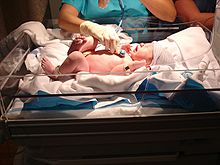- Neonatology
-
Neonatologist Occupation Names Doctor, Medical Specialist Activity sectors Medicine, Pediatrics Description Education required Doctor of Medicine or Doctor of Osteopathic Medicine  Physician performing a physical exam on a newborn baby after a Caesarean section.
Physician performing a physical exam on a newborn baby after a Caesarean section.
Neonatology is a subspecialty of pediatrics that consists of the medical care of newborn infants, especially the ill or premature newborn infant. It is a hospital-based specialty, and is usually practiced in neonatal intensive care units (NICUs). The principal patients of neonatologists are newborn infants who are ill or requiring special medical care due to prematurity, low birth weight, intrauterine growth retardation, congenital malformations (birth defects), sepsis, or birth asphyxias.
Contents
History
While high infant mortality rates were recognized by the British medical community at least as early as the 1860s,[1] modern neonatal intensive care is a relatively recent advance. In 1898 Dr. Joseph B. De Lee established the first premature infant incubator station in Chicago, Illinois. The first American textbook on prematurity was published in 1922. In 1952 Dr. Virginia Apgar described the Apgar score scoring system as a means of evaluating a newborn's condition. It was not until 1965 that the first American newborn intensive care unit (NICU) was opened in New Haven, Connecticut and in 1975 the American Board of Pediatrics established sub-board certification for neonatology.[2]
The 1950s brought a rapid escalation in neonatal services with the advent of mechanical ventilation of the newborn. This allowed for survival of smaller and smaller newborns. In the 1980s, the development of pulmonary surfactant replacement therapy further improved survival of extremely premature infants and decreased chronic lung disease, one of the complications of mechanical ventilation, among less severely premature infants. In 2006 newborns as small as 450 grams and as early as 22 weeks gestation have a chance of survival. In modern NICUs, infants weighing more than 1000 grams and born after 27 weeks gestation have an approximately 90% chance of survival and the majority have normal neurological development.[3]
Academic training
A neonatologist is a physician (MD or DO) practicing neonatology. To become a neonatologist, the physician initially receives training as a pediatrician, then completes an additional training called a fellowship (for 3 years in the US) in neonatology. Most, but not all neonatologists are board certified in the specialty of Pediatrics by the American Board of Pediatrics, and in the sub-specialty of Neonatal-Perinatal Medicine also by the American Board of Pediatrics. Most countries now run similar programs for fellowship training in Neonatology.
Neonatal Nurse Practioners (NNPs) are advanced practice nurses that specialize in neonatal care. They are considered mid-level providers and often share the workload of NICU care with resident physicians. They are able to treat, plan, prescribe, diagnose and perform procedures within their scope of practice, defined by governing law and the hospital where they work.
Spectrum of care
Rather than focusing on a particular organ system, neonatologists focus on the care of newborns who require ICU hospitalization. They may also act as general pediatricians, providing well newborn evaluation and care in the hospital where they are based. Some neonatologists, particularly those in academic settings, may follow infants for months or even years after hospital discharge to better assess the long term effects of health problems early in life. Some neonatologists perform clinical and basic science research to further our understanding of this special population of patients.
References
- ^ Baines, M.A. (1862). Excessive Infant-Mortality: How Can It Be Stayed?. http://www.neonatology.org/classics/baines.html#note1. Retrieved 2007-02-18.
- ^ American Academy of Pediatrics (2001). "Committee Report: American Pediatrics: Milestones at the Millennium". Pediatrics 107 (6): 1482–1491. doi:10.1542/peds.107.6.1482. PMID 11389283.
- ^ Lemmons, J.A., et al. (2001). "Very Low Birth Weight Outcomes of the National Institute of Child Health and Human Development Neonatal Research Network, January 1995 Through December 1996". Pediatrics 107 (1): 1–8. doi:10.1542/peds.107.1.e1. PMID 11134465.
Categories:
Wikimedia Foundation. 2010.
